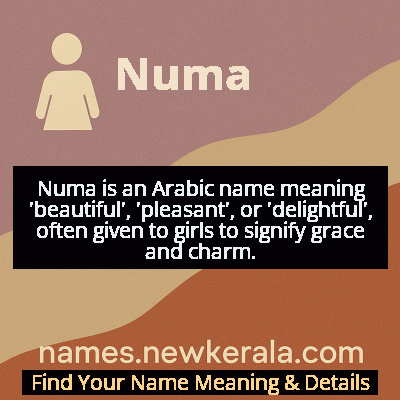Numa Name Meaning & Details
Origin, Popularity, Numerology Analysis & Name Meaning of Numa
Discover the origin, meaning, and cultural significance of the name NUMA. Delve into its historical roots and explore the lasting impact it has had on communities and traditions.
Name
Numa
Gender
Female
Origin
Muslim
Lucky Number
4
Meaning of the Name - Numa
Numa is an Arabic name meaning 'beautiful', 'pleasant', or 'delightful', often given to girls to signify grace and charm.
Numa - Complete Numerology Analysis
Your Numerology Number
Based on Pythagorean Numerology System
Ruling Planet
Uranus (Rahu)
Positive Nature
Strong sense of order, loyal, practical, and disciplined.
Negative Traits
Stubborn, overly serious, rigid, and prone to feeling restricted.
Lucky Colours
Blue, gray.
Lucky Days
Saturday.
Lucky Stones
Blue sapphire.
Harmony Numbers
1, 7, 8.
Best Suited Professions
Managers, engineers, accountants, organizers.
What People Like About You
Dependability, discipline, practicality.
Famous People Named Numa
Numa Pompilius
Religious Reformer and King
Second legendary king of Rome who established many religious institutions and calendar reforms
Numa Sadoul
Writer and Actor
French writer known for his interviews with famous comic artists and his work in theater
Numa Denis Fustel de Coulanges
Historian
French historian famous for his work 'The Ancient City' analyzing Greco-Roman religious and social structures
Numa Ayrinhac
Musician and Composer
French-born American composer and musician known for his contributions to traditional music
Name Variations & International Equivalents
Click on blue names to explore their detailed meanings. Gray names with will be available soon.
Cultural & Historical Significance
In Islamic contexts, while Numa is not a traditionally common Arabic name, it resonates with similar-sounding words meaning 'blessing' or 'favor' (نعمة), giving it positive spiritual connotations. The name's gentle phonetics and positive meanings have allowed it to cross cultural boundaries, making it accessible to Muslim families seeking names that work well in multicultural environments. The name's ability to bridge classical Roman heritage with contemporary Islamic usage demonstrates how names can evolve and adapt across time and cultures while maintaining their essential positive qualities of wisdom, grace, and spiritual depth.
Extended Personality Analysis
Individuals bearing the name Numa typically exhibit a remarkable blend of wisdom, serenity, and diplomatic skill that makes them natural peacemakers and advisors. Their calm demeanor often masks a deep intellectual curiosity and spiritual awareness, leading them to pursue knowledge and understanding throughout their lives. These individuals tend to approach challenges with thoughtful consideration rather than impulsive reactions, making them excellent problem-solvers in both personal and professional contexts. Their innate sense of justice and fairness, combined with their ability to see multiple perspectives, positions them as valuable mediators in conflicts.
The historical association with King Numa Pompilius contributes to expectations of leadership qualities, though typically of a more contemplative and spiritual nature rather than aggressive or domineering. Those named Numa often demonstrate strong organizational skills and a methodical approach to life, reflecting the legendary king's establishment of Rome's religious calendar and institutions. Their relationships tend to be deep and meaningful rather than numerous, as they value quality connections built on mutual respect and intellectual compatibility. This combination of spiritual depth, practical wisdom, and emotional intelligence makes people named Numa particularly effective in roles requiring guidance, education, or community leadership.
Modern Usage & Popularity
In contemporary naming practices, Numa maintains a distinctive presence as an uncommon but meaningful choice that appeals to parents seeking names with historical significance and cross-cultural flexibility. While not ranking among popular name lists in most countries, it enjoys steady usage particularly among families with interests in classical history or those seeking names that work well in multicultural environments. The name's short, melodic structure and easy pronunciation across languages contribute to its international appeal. In Muslim communities specifically, the name's similarity to Arabic words meaning 'blessing' and its gentle, feminine sound make it an attractive option, though it remains relatively rare compared to traditional Islamic names. Recent years have seen a slight increase in usage as parents increasingly seek unique names with substantial meaning and historical depth, positioning Numa as a sophisticated alternative to more common classical names while maintaining its elegant simplicity and rich cultural heritage.
Symbolic & Spiritual Meanings
Symbolically, Numa embodies a rich tapestry of meanings that span spiritual guidance, peaceful leadership, and divine blessing. The name's strongest symbolic association comes from Numa Pompilius, representing the archetype of the wise ruler who governs through spiritual insight and peaceful means rather than military force. This symbolism extends to modern interpretations of the name as representing harmony, balance, and the ability to bring order to chaos. The legendary relationship between Numa and the nymph Egeria adds a layer of mystical symbolism, suggesting divine inspiration and the connection between earthly wisdom and spiritual guidance.
In its Arabic linguistic context, the name resonates with concepts of divine favor and grace, symbolizing the blessings that flow from spiritual alignment and righteous living. The name also carries symbolic weight as a bridge between cultures, representing the possibility of meaningful connections across different traditions and historical periods. For contemporary bearers, the name symbolizes a combination of ancient wisdom and modern sensibility, tradition and innovation, spiritual depth and practical effectiveness. This multidimensional symbolism makes Numa a name that represents not just personal identity but also cultural continuity and the timeless human quest for meaning, balance, and harmonious existence.

